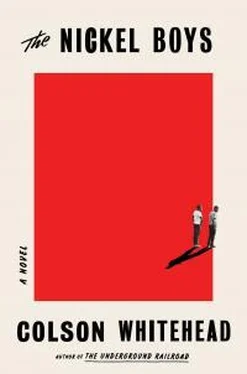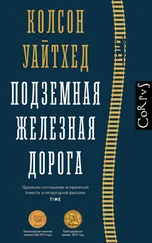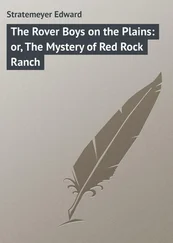Колсон Уайтхед - The Nickel Boys
Здесь есть возможность читать онлайн «Колсон Уайтхед - The Nickel Boys» весь текст электронной книги совершенно бесплатно (целиком полную версию без сокращений). В некоторых случаях можно слушать аудио, скачать через торрент в формате fb2 и присутствует краткое содержание. Год выпуска: 2019, Издательство: Penguin Random House LLC, Жанр: roman, на английском языке. Описание произведения, (предисловие) а так же отзывы посетителей доступны на портале библиотеки ЛибКат.
- Название:The Nickel Boys
- Автор:
- Издательство:Penguin Random House LLC
- Жанр:
- Год:2019
- ISBN:нет данных
- Рейтинг книги:4 / 5. Голосов: 1
-
Избранное:Добавить в избранное
- Отзывы:
-
Ваша оценка:
- 80
- 1
- 2
- 3
- 4
- 5
The Nickel Boys: краткое содержание, описание и аннотация
Предлагаем к чтению аннотацию, описание, краткое содержание или предисловие (зависит от того, что написал сам автор книги «The Nickel Boys»). Если вы не нашли необходимую информацию о книге — напишите в комментариях, мы постараемся отыскать её.
), that the world began to care.
The Nickel Boys — читать онлайн бесплатно полную книгу (весь текст) целиком
Ниже представлен текст книги, разбитый по страницам. Система сохранения места последней прочитанной страницы, позволяет с удобством читать онлайн бесплатно книгу «The Nickel Boys», без необходимости каждый раз заново искать на чём Вы остановились. Поставьте закладку, и сможете в любой момент перейти на страницу, на которой закончили чтение.
Интервал:
Закладка:
Elwood was twelve when the encyclopedias appeared. One of the busboys dragged a stack of boxes into the kitchen and called for a powwow. Elwood squeezed in—it was a set of encyclopedias that a traveling salesman had left behind in one of the rooms upstairs. There were legends about the valuables that rich white people left in their rooms, but it was rare that this kind of plunder made it down to their domain. Barney the cook opened the top box and held up the leather-bound volume of Fisher’s Universal Encyclopedia, Aa–Be. He handed it to Elwood, who was surprised at how heavy it was, a brick with pages edged in red. The boy flipped through, squinting at the tiny words— Aegean, Archimedes, Argonaut —and had a picture of himself on the front-room couch copying words he liked. Words that looked interesting on the page or that sounded interesting in his imagined pronunciations.
Cory the busboy offered up his find—he didn’t know how to read and had no immediate plans to learn. Elwood made his bid. Given the personality of the kitchen, it was hard to think of anyone else who’d want the encyclopedias. Then Pete, one of the new dishwashers, said he’d race him for it.
Pete was a gawky Texan who’d started working two months prior. He was hired to bus tables, but after a few incidents they moved him to the kitchen. He looked over his shoulder when he worked, as if worried about being watched, and didn’t talk much, although his gravelly laughter made the other men in the kitchen direct their jokes toward him over time. Pete wiped his hands on his pants and said, “We got time before the dinner service, if you’re up for it.”
The kitchen made a proper contest of it. The biggest yet. A stopwatch was produced and handed to Len, the gray-haired waiter who’d worked at the hotel for more than twenty years. He was meticulous about his black serving uniform, and maintained that he was always the best-dressed man in the dining room, putting the white patrons to shame. With his attention to detail, he’d make a dedicated referee. Two fifty-plate stacks were arranged, after a proper soaking supervised by Elwood and Pete. Two busboys acted as seconds for this duel, ready to hand over dry replacement rags when requested. A lookout stood at the kitchen door in case a manager happened by.
While not prone to bravado, Elwood had never lost a dish-drying contest in four years, and wore his confidence on his face. Pete had a concentrated air. Elwood didn’t perceive the Texan as a threat, having out-dried the man in prior competitions. Pete was, in general, a good loser.
Len counted down from ten, and they began. Elwood stuck to the method he’d perfected over the years, mechanistic and gentle. He’d never let a wet plate slip or chipped one by setting it on the counter too quickly. As the kitchen men cheered them on, Pete’s mounting stack of dried plates unnerved Elwood. The Texan had an edge on him, displaying new reserves. The onlookers made astonished noises. Elwood hurried, chasing after the image of the encyclopedias in their front room.
Len said, “Stop!”
Elwood won by one plate. The men hollered and laughed and traded glances whose meaning Elwood would interpret later.
Harold, one of the busboys, slapped Elwood on the back. “You were made to wash dishes, slick.” The kitchen laughed.
Elwood returned volume Aa–Be to its box. It was a fancy reward.
“You earned it,” Pete said. “I hope you get a lot of use out of them.”
Elwood asked the housekeeping manager to tell his grandmother he was going home. He couldn’t wait to see the look on her face when she saw the encyclopedias on their bookshelves, elegant and distinguished. Hunched, he dragged the boxes to the bus stop on Tennessee. To see him from across the street—the serious young lad heaving his freight of the world’s knowledge—was to witness a scene that might have been illustrated by Norman Rockwell, if Elwood had had white skin.
At home, he cleared Hardy Boys and Tom Swifts from the green bookcase in the front room and unpacked the boxes. He paused with Ga, curious to see how the smart men at the Fisher company handled galaxy. The pages were blank—all of them. Every volume in the first box was blank except for the one he’d seen in the kitchen. He opened the other two boxes, his face getting hot. All the books were empty.
When his grandmother came home, she shook her head and told him maybe they were defective, or dummy copies the salesman showed to customers as samples, so they could see how a full set would look in their homes. That night in bed his thoughts ticked and hummed like a contraption. It occurred to him that the busboy, that all the men in the kitchen had known the books were empty. That they had put on a show.
He kept the encyclopedias in the bookcase anyway. They looked impressive, even when the humidity peeled back the covers. The leather was fake, too.
The next afternoon in the kitchen was his last. Everyone paid too much attention to his face. Cory tested him with “How’d you like those books?” and waited for a reaction. Over by the sink Pete had a smile that looked as if it had been hacked into his jaw with a knife. They knew. His grandmother agreed that he was old enough to stay in the house by himself. Through high school, he went back and forth over the matter of whether the dishwashers had let him win all along. He’d been so proud of his ability, dumb and simple as it was. He never settled on one conclusion until he got to Nickel, which made the truth of the contests unavoidable.
CHAPTER TWO
Saying goodbye to the kitchen meant saying goodbye to his separate game, the one he kept private: Whenever the dining-room door swung open, he bet on whether there were Negro patrons out there. According to Brown v. Board of Education, schools had to desegregate—it was only a matter of time before all the invisible walls came down. The night the radio announced the Supreme Court’s ruling, his grandmother shrieked as if someone had tossed hot soup in her lap. She caught herself and straightened her dress. “Jim Crow ain’t going to just slink off,” she said. “His wicked self.”
The morning after the decision, the sun rose and everything looked the same. Elwood asked his grandmother when Negroes were going to start staying at the Richmond, and she said it’s one thing to tell someone to do what’s right and another thing for them to do it. She listed some of his behavior as proof and Elwood nodded: Maybe so. Sooner or later, though, the door would swing wide to reveal a brown face—a dapper businessman in Tallahassee for business or a fancy lady in town to see the sights—enjoying the fine-smelling fare the cooks put out. He was sure of it. The game began when he was nine, and three years later the only colored people he saw in the dining room carried plates or drinks or a mop. He never stopped playing, up until his afternoons at the Richmond ended. Whether his opponent in this game was his own foolishness or the mulish constancy of the world was unclear.
Mr. Parker was not the only one who saw a worthy employee in Elwood. White men were always extending offers of work to Elwood, recognizing his industrious nature and steady character, or at least recognizing that he carried himself differently than other colored boys his age and taking this for industry. Mr. Marconi, the proprietor of the tobacco shop on Macomb Street, had watched Elwood since he was a baby, squealing in a noisy carriage that was half rust. Elwood’s mother was a slim woman with dark, tired eyes who never moved to quiet her child. She’d buy armfuls of movie magazines and vanish into the street, Elwood howling all the way.
Mr. Marconi left his perch by the register as seldom as possible. Squat and perspiring, with a low pompadour and a thin black mustache, he was inevitably disheveled by evening. The atmosphere at the front of the store was stringent with his hair tonic and he left an aromatic trail on hot afternoons. From his chair, Mr. Marconi observed Elwood grow older and lean toward his own sun, veering away from the neighborhood boys, who carried on and roughhoused in the aisles and slipped Red Hots into their dungarees when they thought Mr. Marconi wasn’t looking. He saw everything, said nothing.
Читать дальшеИнтервал:
Закладка:
Похожие книги на «The Nickel Boys»
Представляем Вашему вниманию похожие книги на «The Nickel Boys» списком для выбора. Мы отобрали схожую по названию и смыслу литературу в надежде предоставить читателям больше вариантов отыскать новые, интересные, ещё непрочитанные произведения.
Обсуждение, отзывы о книге «The Nickel Boys» и просто собственные мнения читателей. Оставьте ваши комментарии, напишите, что Вы думаете о произведении, его смысле или главных героях. Укажите что конкретно понравилось, а что нет, и почему Вы так считаете.

![Колсон Уайтхед - Подземная железная дорога [litres]](/books/411182/kolson-uajthed-podzemnaya-zheleznaya-doroga-litres-thumb.webp)










